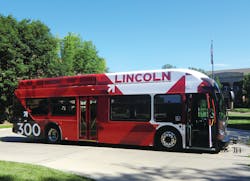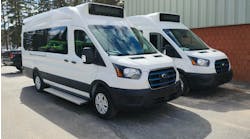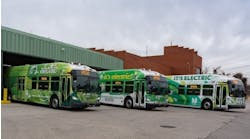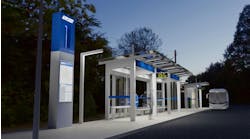Mayor Chris Beutler and StarTran officials today celebrated the arrival of five new compressed natural gas (CNG) buses, which will be less expensive to operate and better for the environment. StarTran plans to add eight more CNG buses and 11 CNG handi-vans over the next two years.
"Over the 15-year lifetime of these vehicles, the City will save about $1.3 million in lower fuel costs and reduced maintenance," Mayor Beutler said. "At the same time, natural gas produces 25 percent less greenhouse gas emissions than diesel fuel. These vehicles will benefit the entire community and demonstrate the dedication of StarTran to a high-quality, cost efficient transit system."
The buses, engineered by New Flyer, replace buses which have been in service for over 12 years. They cost about $484,000 each, with an additional cost of about $35,000 for the CNG fuel system. StarTran Transit Manager Mike Davis said the additional investment in the CNG systems will pay off in about six years. State funding covered the additional cost on three of the first five buses, and Mayor Beutler thanked Black Hills Energy for donating $70,000 to cover the additional cost on the other two.
"From an economic and environmental standpoint, the benefits of natural gas as a vehicle fuel grow more enticing every day," said Jeff Sylvester, Black Hills Energy's Vice President of Nebraska natural gas operations. "Congratulations to StarTran and the City of Lincoln for joining the thousands of communities and businesses across the country that are saving taxpayers money or increasing profits with natural gas vehicles."
The Mayor also recognized Hexagon Lincoln, the local company that manufactured the CNG tanks on the first five buses. "I commend StarTran Transit Manager Mike Davis and Mayor Beutler for being environmentally progressive and fiscally minded in procuring these New Flyer CNG buses," said Jack Schimenti, President of Hexagon Lincoln. "We are pleased to be part of the Lincoln community and look forward to more successes in the future."
The new CNG buses are also the first to be painted with a new design based on the City's branding initiative developed by ArchRival. The 30-passenger buses will be used on the UNL routes. Davis said that once the 24 CNG vehicles are in operation, they will make up about one-third of the StarTran fleet.
Davis said another benefit of CNG is increased safety. CNG storage tanks are stronger than gasoline or diesel fuel tanks, reducing the likelihood of accidental release. If released, CNG disperses quickly into the air instead of forming pools on the ground, thus reducing the risk of fire and ground contamination. Davis said CNG engines also operate more quietly than diesel engines.
To create CNG, natural gas is sourced from underground reserves and then compressed to about 1 percent of its volume. About 1,300 natural gas fueling stations are now open in the U.S. Davis said CNG is about $1.50 less per gallon than diesel, and the stability of CNG prices makes it easier to plan for long-term costs.
StarTran has been recognized nationally as a transit industry leader in the use and promotion of alternative fuels.
- Between 1994 and 2000, four buses powered by a blend of 95 percent ethanol and 5 percent gas were in regular transit. From 2000 to 2008, the entire fleet was powered by a fuel blend of 8 percent ethanol and 92 percent diesel.
- In 1994, StarTran began powering two buses with biodiesel, which includes soybean oil. In 2008, the entire remaining fleet began using biodiesel.
- In 2010, StarTran used federal stimulus funds to replace 10 handi-vans and three fixed-route buses with hybrid vehicles, powered by a combination of gasoline and electricity.




